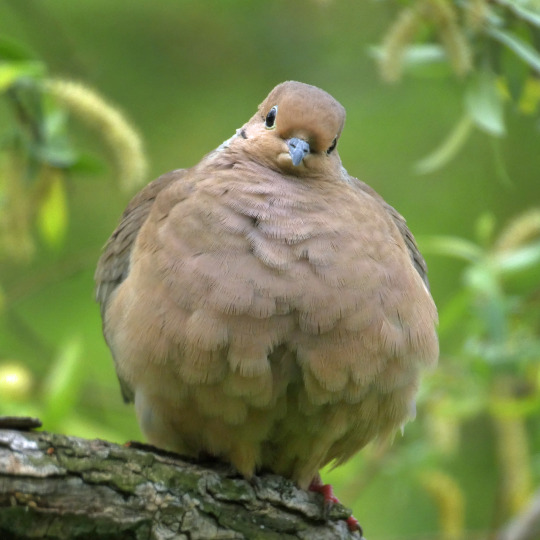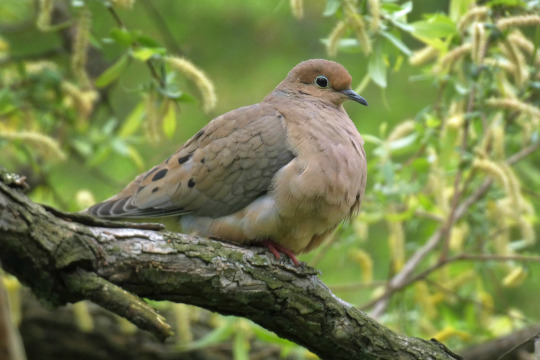#zenaida dove
Explore tagged Tumblr posts
Text
BOTD: Zenaida Dove

Photo: Brandon Trentler
"When Audubon explored Florida in the 1830s, he apparently found Zenaida Doves nesting on the Florida Keys. Today the species is only a very rare visitor to Florida from the islands of the Caribbean. Like its relatives, the Mourning and White-winged doves, it usually feeds on the ground in brushy or semi-open areas."
- Audubon Field Guide
#birds#zenaida dove#birds of north america#north american birds#doves#birds of the caribbean#birding#bird watching#birdblr#birblr#bird of the day#Zenaida aurita
67 notes
·
View notes
Text

Zenaida dove (Zenaida aurita)
Part of a collection of watercolor images by "M. Rabié" for St. Domingue Oiseaux. Dated 1766.
Internet Archive
86 notes
·
View notes
Text


[ID: two pigeons, the first, the Mourning dove, pale brown with black spots on it's wings perched on a wooden post. the second, the Zenaida dove, red-brown with black and white wing spots and purple on its neck walks on a ledge]
26 notes
·
View notes
Note
You got any mourning dove pictures over there?
I'm literally sitting next to one right now, and we were just talking about you...

Mourning Dove (Zenaida macroura), family Columbidae, order Columbiformes, Suffolk, MA, USA
photograph by Ryan Schain

Mourning Dove (Zenaida macroura), mother and chicks, family Columbidae, order Columbiformes, Mesa, AZ, USA
photograph by Andrew Atzert
547 notes
·
View notes
Text

Day 3: Mourning dove
587 notes
·
View notes
Text

Simplified bird #8 - mourning dove
( requested by anon )
#quite a couple other people requested this too i think#simplified birds#mourning dove#dove#doves#art#bird#bird drawing#birds#drawing#doodle#Zenaida macroura
558 notes
·
View notes
Text


Mourning Dove (Zenaida macroura)
May 3, 2023
Southeastern Pennsylvania
#bird#birds#photographers on tumblr#mourning dove#Zenaida macroura#birdblr#birblr#birb#birbs#borb#borbs#nature#animals#ornithology
3K notes
·
View notes
Text

Mourning dove / huilota común (Zenaida macroura), nesting in an ornamental cherry tree, Sierra Vista, Arizona.
217 notes
·
View notes
Text

Mourning Dove (Zenaida macroura), taken June 28, 2024, in Georgia, US
Pondering, I believe. Sometimes life is just sitting on the edge of the bird bath and overlooking the koi pond a few feet ahead.
26 notes
·
View notes
Text

Mourning Dove
160 notes
·
View notes
Text
BOTD: Mourning Dove

Photo: Mick Thompson
"The mournful cooing of the Mourning Dove is one of our most familiar bird sounds. From southern Canada to central Mexico, this is one of our most common birds, often abundant in open country and along roadsides. European settlement of the continent, with its opening of the forest, probably helped this species to increase. It also helps itself, by breeding prolifically: in warm climates, Mourning Doves may raise up to six broods per year, more than any other native bird."
- Audubon Field Guide
#birds#mourning dove#birds of north america#north american birds#doves#birds of the us#birds of canada#birds of mexico#birds of central america#birds of the caribbean#birding#birdblr#birblr#bird of the day#bird watching#Zenaida macroura
147 notes
·
View notes
Text


This photo of a mourning dove on a rusty fence was snapped in California. I always find them particularly striking against rusty metal. My favorite thing about them is their little beauty mark. <3
Mourning doves are intricately intertwined with the history of dove hunting in the US— and thanks to the Migratory Bird Treaty of 1918, is unlikely to go the way of the endemic American passenger pigeon. Dove hunting, as popular as it is, led to those regulations around it being clarified in 1999.
Another one of my favorite mourning dove facts— their wings whistle when they take off!
P.S. You can find this pixel art bird design as a sticker here. :3
#mourning dove#zenaida macroura#birdwatching#their call is also often mistaken for an owl#pixel art#bird art#image description in alt
14 notes
·
View notes
Text
!!!ROUND!!! 1!!!! POLL!!!! 87!!!


[ID: two pigeons, the Eared dove, various shades of light brown, with black wing spots and gold feathers on its neck. it stands on a rock. and the Zenaida dove, red-brown with black and white wing spots and purple on its neck sits on a ledge]
2 more pigeons with sparkly necks! look at these wonderful birds!!
while all pigeon have ears, the Eared dove has them in is name! but maybe the Zenaida dove's beautiful looks will win you over?
13 notes
·
View notes
Text


post this freak
#my art#yuuup headguys again#alter art#alter: zenaida#2 forms bc xe really just takes the colors of different doves at any given time
10 notes
·
View notes
Text

aparently a dove decided to make her home on top of one of our plantpots?? and she has two little eggs there already????
#this is a white-winged dove (zenaida asiatica) btw#they usually make their nests in very high places like cactus big trees and on top of buildings#so i understand why she choose that spot#very high from the floor#and from the cat#i talk#bird
17 notes
·
View notes
